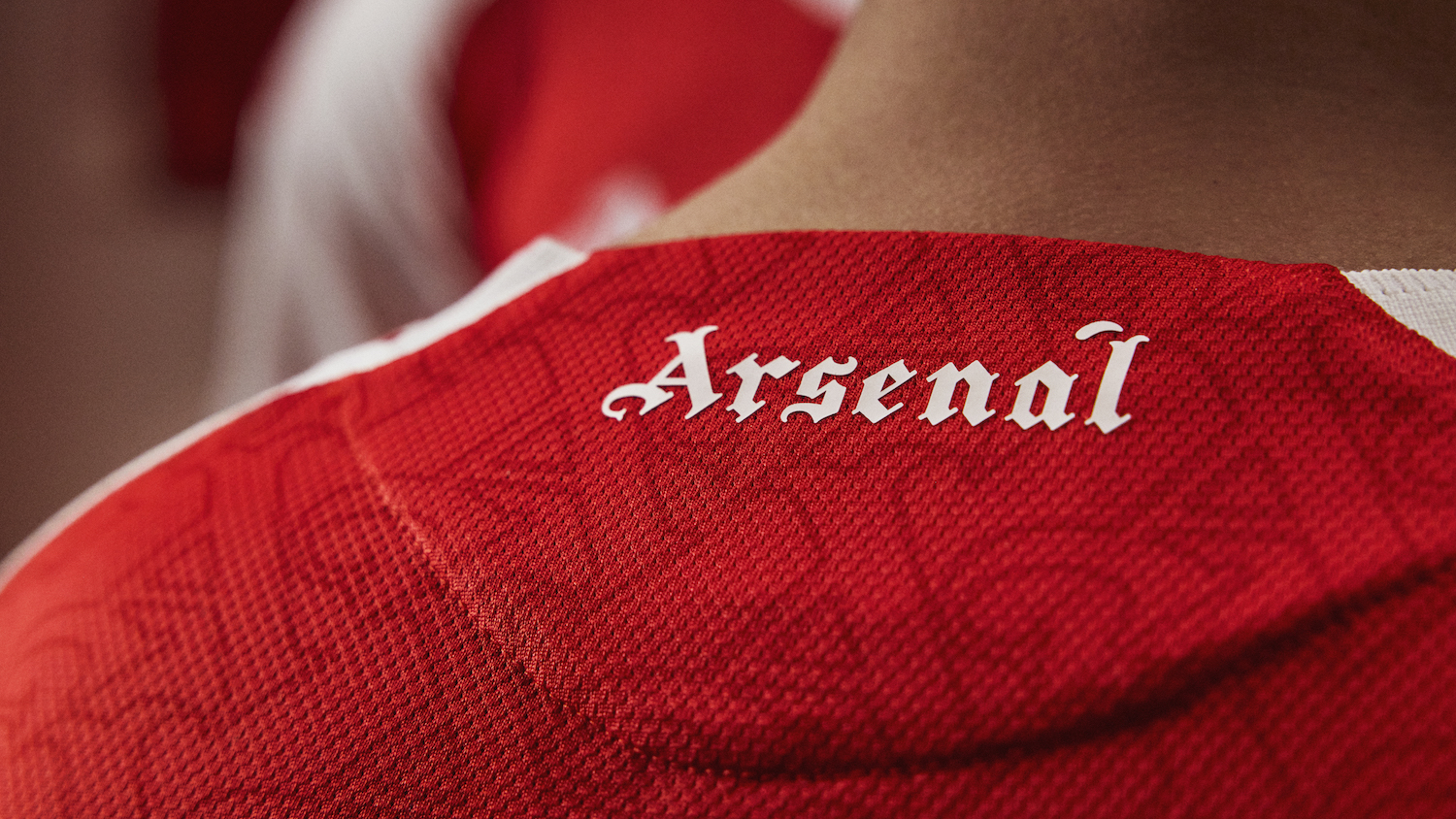You Ask The Questions: Ole Gunnar Solskjaer – "I want to play with creativity and imagination, just as I learned under Sir Alex Ferguson"
He's on the precipice of conquering Europe with Manchester United once more - let's look back at when we met Ole back in 2016...
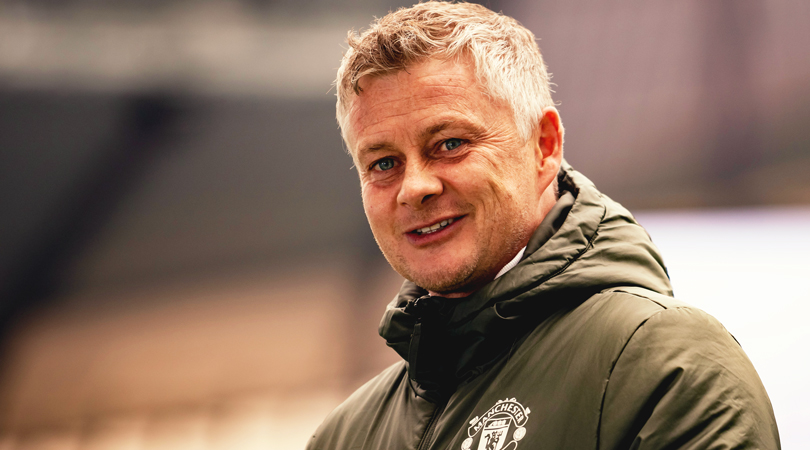
Please note: This feature originally appeared in the April 2016 issue of FourFourTwo magazine. Subscribe!
“We have a saying in Norway: there’s no such thing as bad weather, only bad clothing,” Ole Gunnar Solskjaer chuckles as FFT shivers pitchside at Molde’s smart Aker Stadion, an arena his £1.5 million transfer to Manchester United helped build.
It’s just above freezing and snow is on the ground in this tiny city of 25,000 people on the banks of the Romsdalsfjord, where the blizzards are followed by brief periods of bright sunshine, allowing stunning vistas of the 222 peaks of the surrounding mountains.
Solskjaer grew up a few miles away at the other end of the treacherous Atlantic Road in Kristiansund, but it’s in Molde where arguably the greatest super-sub of all time forged his reputation as a player and manager. If his ill-fated period as Cardiff City boss left him pining for the fjords, he is reinvigorated by his return for a second spell in charge of Molde. In fact, he’s positively beaming when we arrive.
“I’ve always read FourFourTwo,” he says, explaining how he bought the magazine even before he moved to England in 1996. A lot has happened in the 20 years since…
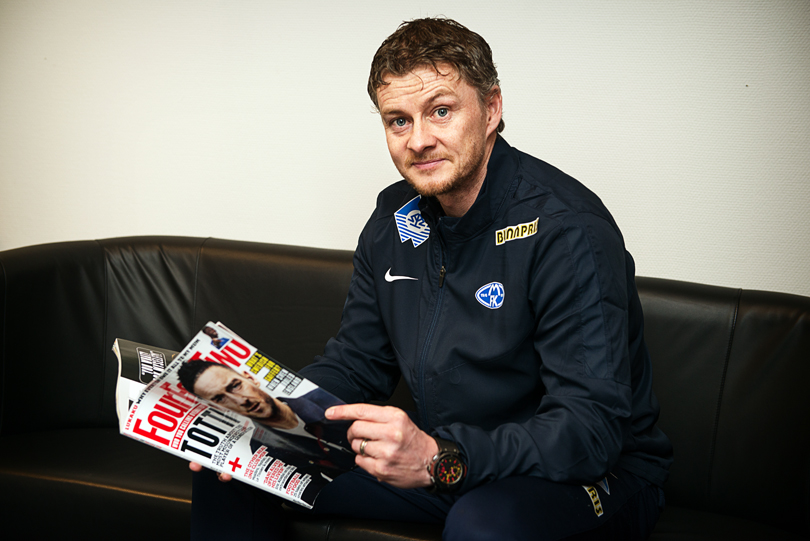
Were you a fan of your ‘Baby-Faced Assassin’ nickname? Did your youthful looks give you any advantages or disadvantages as a kid?
James, London
The nickname was no problem. It was nice to be given one! When I came to the Premier League, I knew I looked young, but I could still be a devil – if I had to hit a player’s ankle in a tackle, I hit his ankle. Were there any benefits when I was younger? None at all. I remember on one family holiday to Majorca you had to be either 15 years of age or above 140cm to go on this slide. I was over 15 but they still wouldn’t let me go on the slide! I was tiny at that age. I was a very late developer – I only really started developing when I was 20 or 21. Then I moved from my local team, Clausenengen, to Molde and my career took off.
The best features, fun and footballing quizzes, straight to your inbox every week.
Is it true that your dad was a champion Greco-Roman wrestler? Did you wrestle?
Greg, Guildford
It’s true about my dad. I wrestled between the ages of eight and 10 but I was training with one of the best wrestlers in Norway in my age group. I was being tossed around, getting dizzy, getting headaches... I was never into it!
Did you really grow up a Liverpool fan?
Gemma, Huyton
You learn as long as you live, that’s the only answer I can give you… I never confirm that one! I’m a Manchester United fan through and through. I bleed red.
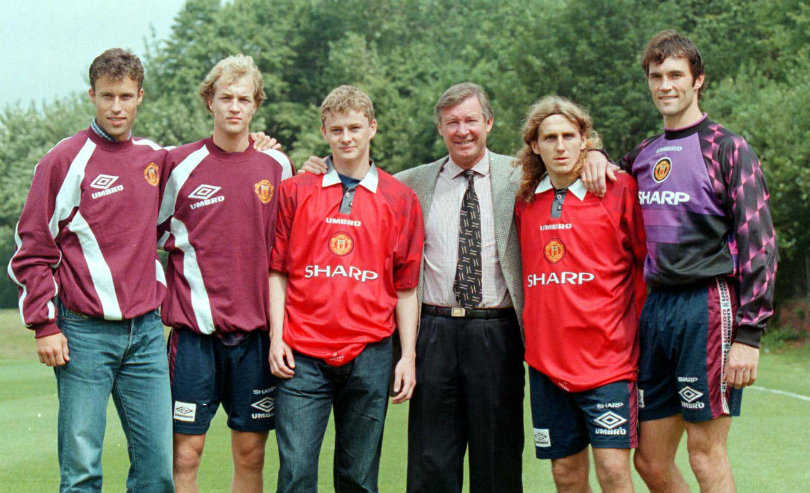
What was the most goals you scored in a match for your first club, Clausenengen?
Steven, Salford
I scored 14 in an indoor tournament, in the quarter-final of the Norwegian championship. Goals were my trademark, although if my team didn’t create chances I wouldn’t have been the one to stand out and dribble past three or four people. I was very dependent on my team-mates. We only had crowds of 50 or 100 at Clausenengen but we were best mates growing up together in the third and fourth tiers in Norway.
How quickly did you attract interest from other countries after you joined Molde?
Kjetil, Oslo
Quickly, because I scored two in my first game for Molde and three in my second. I had meetings with Felix Magath at Hamburg, and Giovanni Trapattoni wanted me at Cagliari. PSV and Bayern Munich were interested. So were Liverpool, but there was no offer from them. There was only the Manchester United offer.
What do you remember about your move from Molde to Manchester United?
Jane, Wilmslow
I scored two decent volleys for Norway against Azerbaijan, then my agent said Manchester United were impressed and wanted to do something before Martin Edwards went on holiday. It had to happen quickly, so Molde’s owners rented a private jet and flew me to Manchester, because they could see I wanted to go there. I’ll always appreciate that. I got to Old Trafford and a tour guide thought I was going for a tour. He was talking away, then at the end he asked me: “So what are you doing here?” I said I was going in to sign a contract! He was speechless. But he gave me his pen and I signed the contract with that pen.
You signed for Manchester United in 1996, the year they missed out on Alan Shearer to Newcastle. Was there expectation on you?
Tyrone, Shrewsbury
None whatsoever. The gaffer said: “For the first six months, play in the reserves and get used to England, then from January we might try to get you into the first team.” But I scored two in my first reserves game, Andy Cole got injured and we needed strikers. I came on and scored six minutes into my debut against Blackburn. I knew I’d score goals at United. I’d always been clinical finishing chances. As a youngster on the playground, even if there was no keeper I would always shoot just inside the posts, because no goalkeeper would save it.
What was it like to play under Alex Ferguson?
Aubrey Sebulela, Pretoria, South Africa
He was an absolute treat. I met Patrice Evra a while back and he said he was enjoying life at Juventus but it was like going to work. At United, we came to Carrington and worked our bollocks off, but we never felt like we went to work. The gaffer always wanted us to express ourselves. He’d created an environment with inner justice. Giggsy, Pally [Gary Pallister], Keano, Brian McClair, Cantona, Schmeichel – we demanded 100 per cent of ourselves.
From 2000 onwards, I started to make notes of the sessions that we did. I’ve got all the diaries here with me at Molde. I realised I was experiencing something only my team-mates could experience, because he’s unique. Less was more for him. He never talked for hours but whatever he said made a difference.
I remember you scything down Newcastle’s Rob Lee when he was clean through, earning a red card but saving a certain late goal. Would you advise your players to do the same?
David Shearan, Hebburn
Never. I would advise them not to do it, because I ended up with a fine and a hairdryer! I had to catch Rob Lee before he got into the penalty area. I made up some ground and thought: ‘I’m catching him!’ But I stiffened up in the last five metres and realised I wasn’t catching him…
I was applauded off but I wasn’t applauded by the gaffer. He laid down the law with me and said: “At Manchester United we never win that way; we win by fair play.” It was an eye-opener for me. Some managers would have said ‘well done, son’, but he would not accept that way of winning, which says everything about him.
How did it feel to beat Brazil at a World Cup? Was that the highlight of your international career? Why have Norway struggled since?
Egil, Bergen
A lot of clubs here have artificial pitches now – I don’t think that helps. It’s almost like basketball. There are no tackles. The [1998] World Cup was strange for me. I was taken off after 45 minutes against Morocco, I didn’t play in the second game, and then I came on against Brazil. It was fantastic being part of that team, though, and beating Brazil must be the highlight of my international career.
In 1998 there were rumours you’d be sold to Tottenham. What did you know about this?
Daniel, Manchester
Martin Edwards and Alan Sugar had agreed a fee – £5.5m, I think. But the gaffer called me into his office and said: “I don’t really want to sell you because if you stay here you’ll play enough football.” That was enough for me. I didn’t want to go; my agent did. He said he had never met a person as stubborn as me. But I was right. I normally am!
Did you think you’d make much of an impact when you came on at Nottingham Forest, before scoring four goals in the final 10 minutes?
Daniel Barker, Grimsby
It was Steve McClaren’s first game as assistant manager and Jim Ryan, the first-team coach, said: “You’re going to come on, Ole. We’re winning 4-1 so there’s no need to do anything stupid – just keep the ball.” I thought: ‘Yeah, right!’ I had a chance to prove myself to the new assistant manager – I was never going to just keep hold of the ball. To score four times was very special.
What did Ferguson say to you when he put you on in the 1999 Champions League Final?
Adam Lampard, Notting Hill
Nothing special, but he did speak to Teddy at length at half-time and that pissed me off. I thought: ‘I’ve scored 17 goals for you this season, mostly coming on as sub – aren’t you going to speak to me?’ Then Teddy went on.
That’s the way to trigger me; to make me feel: ‘I’m going to prove you wrong’. I forget what the gaffer said to me afterwards, but I’ve got a picture of us together and I will always remember thinking at that moment: ‘You deserve this – you deserve so much to win the Champions League’. We did it for him, as a manager. You almost well up when you think about it. He was that kind of manager.
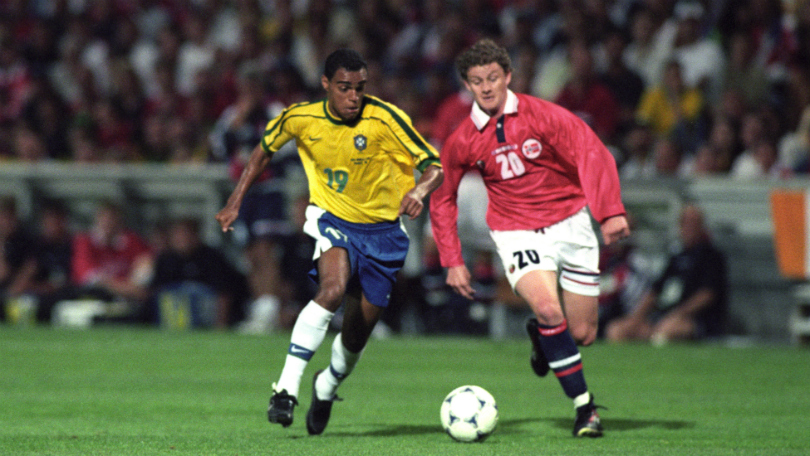
I watched the 1999 Champions League Final as a 10-year-old on my parents’ black and white 14-inch TV. The joy I felt at your goal can’t really be explained – even now I get goosebumps when I watch highlights of that game. How did you feel when you scored?
Nathan Sichilima, Zambia
My first thought was: ‘Am I offside?’ You’re scared the referee is going to blow. But then it was just complete and utter chaos. You don’t manage to think. I strained my ligaments sliding on my knees to celebrate and I missed a couple of games for Norway that summer because of it, but it was worth it!
Winning the Champions League is the best thing you could ever do as a footballer. I’d scored the winning goal in the European Cup final so many times in my mind. I was on my own in the playground, commentating: ‘He’s going through one-on-one with the goalkeeper!’ and thinking: ‘If I hit the back of the net now, we win; if I miss, we lose’. But that was in my head. Realistically, though, I never thought it would really happen. No chance.
There are so many people who have come up to me since and said: ‘That was the best night of my life – don’t tell my wife.’ It seems like such a big moment for them to meet me. It was the same for me when I met Diego Maradona in 1986. We'd driven from Kristiansund to Oslo to watch Norway play Argentina, and after the game I stood there. Maradona finally came out and I just about managed to put my arm out and touch him.
Did you enjoy the ‘super-sub’ tag?
Simon Jackson, via Facebook
I didn’t mind. Obviously I wanted to prove to the gaffer that I deserved to play more, but he had me exactly where he wanted me. He knew that when he put me on the bench I’d be pissed off, but I’d come on and give my all. And it had an effect on the opposition, because it became a myth that I scored every time I came on. I’d rather have that role and make an impact than play 200 games and be average.
At times, though, it could be frustrating. Once, the gaffer spoke to me, Teddy, Coley and Yorkey about why he was rotating players. Me and Coley had played two days beforehand; this time, he was going to play Yorkey and Teddy. He asked: “Is everyone happy with that?” The other three were happy but I sat in his office and said: “No, I’m not. I think I deserve to play. I scored in the last game, you challenged me to play more games in a short space of time and I want to play this game.” I had to go and say: “Teddy, the boss wants you.” In the end he played me, not Teddy! I managed to get myself into the team.
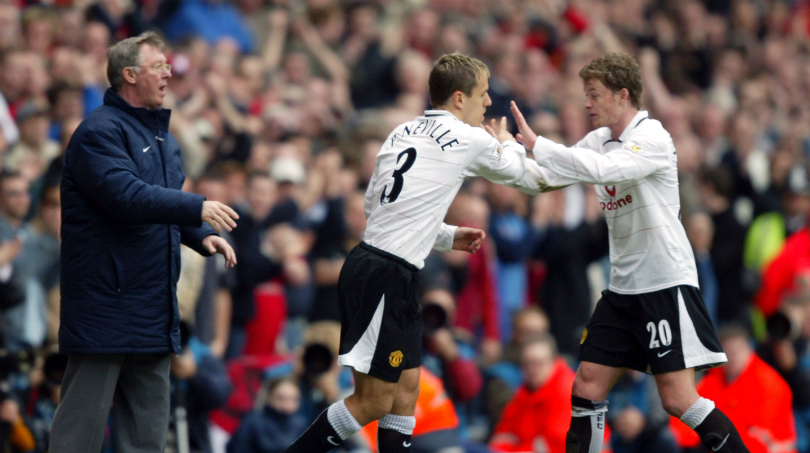
Was Ruud van Nistelrooy the best finisher you played with? Was there anybody you felt was a better finisher than yourself?
Joe Rawlings, via Twitter
Ruud was the best finisher I played with, yes. Everything about him was planned – it wasn’t ‘close your eyes and shoot’. I don’t like strikers who score flukey goals all the time. I never celebrated lucky goals. Once, against Ipswich, I was going to cross for Quinton Fortune but the ball bounced up and it went into the top corner. I was embarrassed, because I’d tried to pass it and ended up scoring a goal. Was anyone a better finisher than me? No! I thought Ruud was good but I never thought that anyone was better than me!
Manchester United are famous for their No.7s and you played with three icons. Who was your favourite: Eric Cantona, David Beckham or Cristiano Ronaldo?
Daniel Shaw, via Twitter
When I came to Manchester United, Cantona was the perfect partner for me. When I finished, you could see that Cristiano was going to end up as one of the best players in the world. But for me, [my favourite was] David Beckham, just because of the way he struck a ball and worked for the team.
Did you ever piss off Roy Keane?
Matt, via Twitter
Many times! Me and Roy are good friends – we speak a lot. But we did have some fights, if you can call them that. I ended up telling him to eff off, because the only way he could respect you was if you stood up for yourself. There was one period of four or five weeks when I was in Roy’s team every single day in training and he shouted and shouted, because he demands 100 per cent from the ones he believes in. So I went up to Steve McClaren and said: “F**king hell, Steve, I’m in the same team every day.” He said: “Oh, you’ve noticed! It’s a mental development for you to stand up for yourself against Roy. You have done, so you’ve passed.”
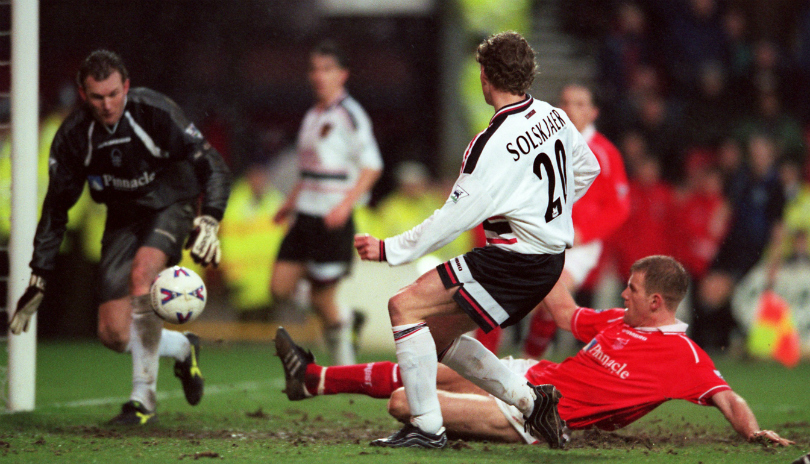
Which defenders did you hate facing the most as a player?
Greg Morter, Grimsby
Jaap Stam in training was the worst by a mile. You couldn’t go past him at all. He was the best. Frank de Boer was a lot better than I thought he was going to be when I played against the Dutch – he was very good. There was Rio Ferdinand when he played for Leeds, too. I hated playing against strong, quick defenders. People like Marcel Desailly, [Paolo] Maldini, [Fabio] Cannavaro and Tony Adams never kicked you out of the game – they were the clever ones. I felt after a game against them that I’d done OK, but I never scored because they were so good at what they did. They never made mistakes.
Is it true that your son’s favourite player during your playing days at Manchester United was Wayne Rooney, not you?
Alan, via email
Yes, it was Wazza! Noah was only six then, but he still knew how to hurt his dad!
Was your first opportunity to become a manager when you were offered the job with the Norwegian national team? If that is true, why did you turn it down?
Christian, Trondheim
Yes, it was. I’d just started coaching at United, I had a good chat with the gaffer and he said: “Why do you want to do that? You can do that when you’re 50.” He was so right. I was in the best place to learn. I thought about it, though.
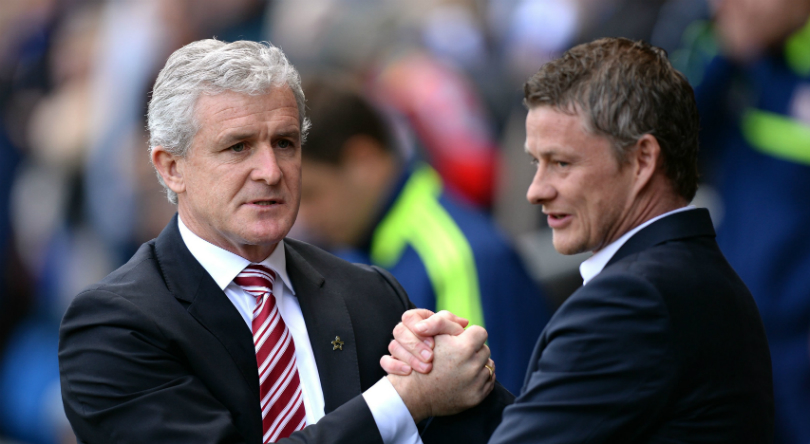
Which was the most challenging aspect of the transition from player to manager?
Jamie Wilkins, London
At Molde I’ve had only success, more or less, so the transition wasn’t difficult at all. I’m very stubborn: I want to do it my way, and the players and the club responded really well to what I wanted to do. The club had never won the league in its history, then we won it twice. But going to Cardiff, that was hard. I was probably the wrong man at the wrong time.
I’d always been at Manchester United or Molde, dominating games and played attacking, entertaining football. I wasn’t mean or cynical enough. My teams weren’t solid enough back then. Now I’ve learned a lot. My team at Molde are a lot more solid now.
Do you regret going to Cardiff? You were linked to Aston Villa before that – why didn’t you go there instead?
@J__Forrest, via Twitter
I’d had approaches before, but I felt Cardiff was the right time for me. I don’t regret it – stand by your decisions. If they’d known what they know now, maybe they wouldn’t have done it; maybe I wouldn’t have done it. It was a valuable experience, but it didn’t turn out well. I feel bad when I look at the results. It’s hard when you get relegated. But I can look back and say I wasn’t ready. And I never dreaded going into work at Cardiff. Vincent [Tan] and I spoke a lot – that was never an issue. He wanted his team to be successful, and he’s right to do what he wants to do. I wish him all the very best.
Do you regret saying: “Let’s make sure we finish above Swansea” when you arrived?
Huw Mellor, Fernham
That was the aim and I felt we could do it, but we were unlucky because Swansea changed their manager just before we played them. That turned their season, and it probably turned ours as well when we lost at their place. They could have waited another week or so before Garry Monk got the job...
How did the initiation ceremonies in football compare with the ones in the army when you did national service?
Dave, via email
I was only 19 but we were all new recruits together so you didn’t have to impress anyone. It’s harder to come into a team of footballers and dance or sing. At Cardiff I sang What Does The Fox Say? in front of the players – it was Norway’s anthem that year. That’s strange when you’re supposed to be the players’ boss. But that was me making a fool of myself in front of them because I wanted them to never be afraid of making mistakes. They were. At times it felt like they thought they weren’t good enough for the Premier League.
Would you rather play for Louis van Gaal or be eaten by a hungry bear?
@TripleMeasures, via Twitter
Before every game Sir Alex would say: “Express yourselves, enjoy the game, show us what you can do, but work your bollocks off.” That’s the Manchester United I want to see again, where players move freely and get in behind. But we’re all different. Louis van Gaal has got a fantastic CV, so I can’t criticise him.
You once said you unwind with Football Manager. Do you still do that as a manager? How realistic is it?
Andy, Gloucester
I’ve not really played it as a manager, although last year when I was out of a job I did play it again because I like to make decisions. The big difference is that there are no human relations. When you get to know players, they’ve got problems: they’ve got kids who are ill or wives who have left them. You can say: ‘I’ll play 4-4-2 or 4-3-3’ but tell an international player: ‘This is the reason I’m leaving you out, again’ and it’s a tough job. Can you trust this agent or that agent? How are you going to answer the press when you have lost? You’ve got two minutes to think of something. On Football Manager you’ve got five options! But it’s a great game.
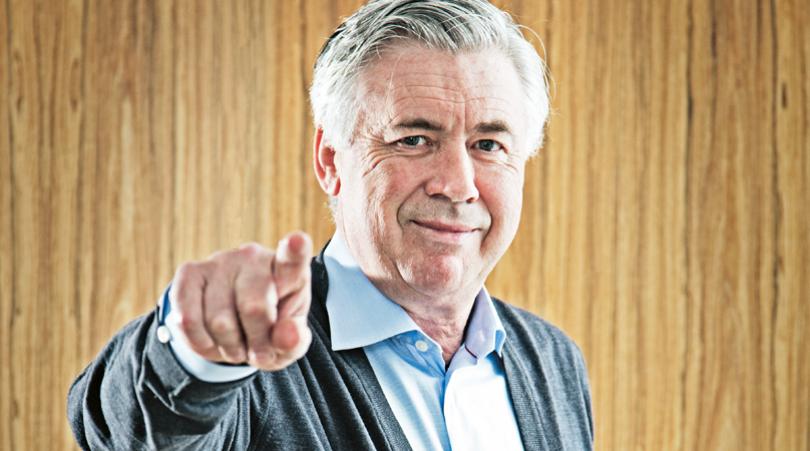
CARLO ANCELOTTI "Once, I kicked a box and it landed on Ibrahimovic’s head. He didn’t react"
EIDUR GUDJOHNSEN "I’ve only been to Iceland once... I didn’t buy anything"
Did your experience with Cardiff put you off managing in the Premier League or Football League again?
@StewartsGloves, via Twitter
I became Molde manager the first time with the aim of doing as well as I could for Molde but knowing I was going to manage in the Premier League. I was chasing that career as a manager. This time I’m not looking at that. I’m completely different in my mindset – if it comes, it comes. We got through [the group] in the Europa League: we beat Celtic twice, we won at Fenerbahce, we didn’t lose to Ajax. It was historic – an unbelievable achievement for this club. To have those matches... no disrespect but when you look at some of the Championship teams that I managed against, this is the better option.
If I manage again in a different country, my team is going to be solid, but I can never stray away from the way I want my teams to play football – with creativity and imagination, just as I learned under Sir Alex Ferguson. Is United still the dream job for me? Every Manchester United player who goes into management has that ultimate dream.
This feature originally appeared in the April 2016 issue of FourFourTwo magazine.
Subscribe to FourFourTwo today and get a FREE England Euro 96 shirt!
NOW READ
RICHARD JOLLY Why do Chelsea struggle to win after falling behind?
ROY HODGSON Why his unique achievements in football may never be equalled
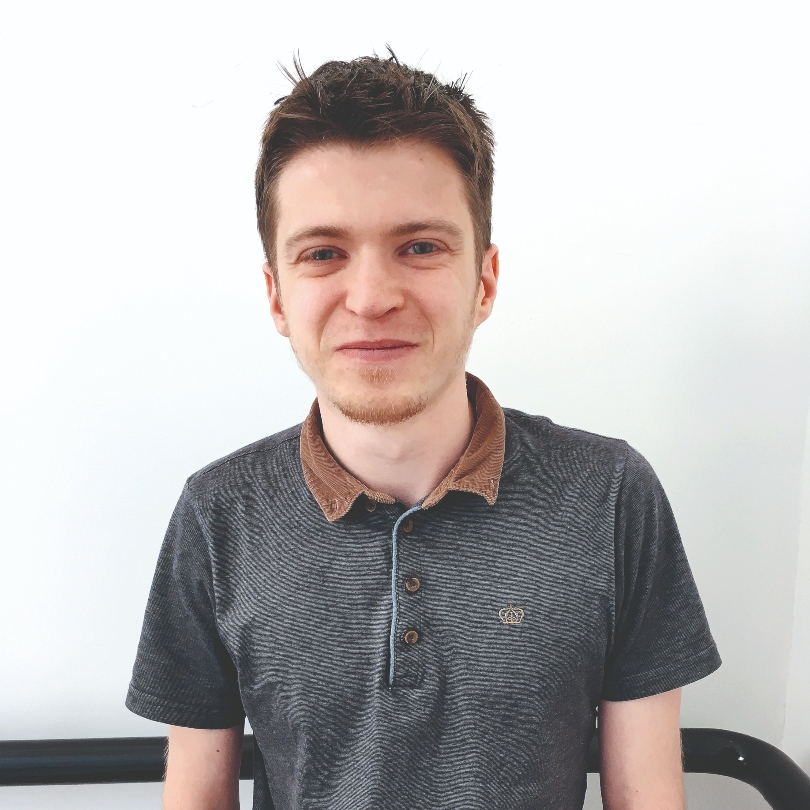
Chris joined FourFourTwo in 2015 and has reported from more than 20 countries, in places as varied as Ivory Coast and the Arctic Circle. He's interviewed Pele, Zlatan and Santa Claus (it's a long story), as well as covering the World Cup, AFCON and the Clasico. He previously spent 10 years as a newspaper journalist, and completed the 92 in 2017.
 Join The Club
Join The Club





